Elevate your camping or backpacking experience with our carefully selected sleeping bags for adults.
The desire for comfortable and revitalizing sleep is a constant when starting a journey, whether it’s an exciting backpacking excursion, a camping trip beneath the stars, or a whirlwind tour of cities.
The world of adult travel sleeping bags may help in this situation by providing a comfortable retreat amidst the thrill and uncertainty of travel.
Adult travel sleeping bags are more than simple bedding options; they are made to be portable, light, and specific to the requirements of travelers.
The ideal travel sleeping bag may be your dependable travel partner, whether you’re negotiating the challenging terrain of the vast outdoors or looking for solitude in a busy hostel dorm.
Remember, you need some travel essentials in your backpack, like the best travel jumpsuit and Hawaiian vacation outfits, as well as your travel slippers.
What is a sleeping bag?
While synthetic-filled sleeping bags are cheaper and maintain certain insulating qualities even when wet, down-filled sleeping bags are renowned for their superior warmth-to-weight ratio.
Users can select a bag that is appropriate for the predicted conditions using these ratings.
Mummy bags are less spacious but more tapered and form-fitting, which helps retain heat.
Typically, one or two of its sides have zippers, making it simple to enter and depart. For ventilation, some bags include two-way zippers.
The hood of many sleeping bags may be tightened around the head to trap heat and add comfort.
Draft collars are insulated collars worn around the neck for increased warmth, while draft tubes are insulated tubes placed along the zipper to keep heat in.
To make the sleeping bag smaller for storage and transit, these are either incorporated or are available as additions.
For anyone spending evenings in the great outdoors, sleeping bags are a necessary piece of equipment. The correct sleeping bag should be chosen based on the anticipated temperature, the sort of outdoor activities, and personal comfort and insulating preferences.
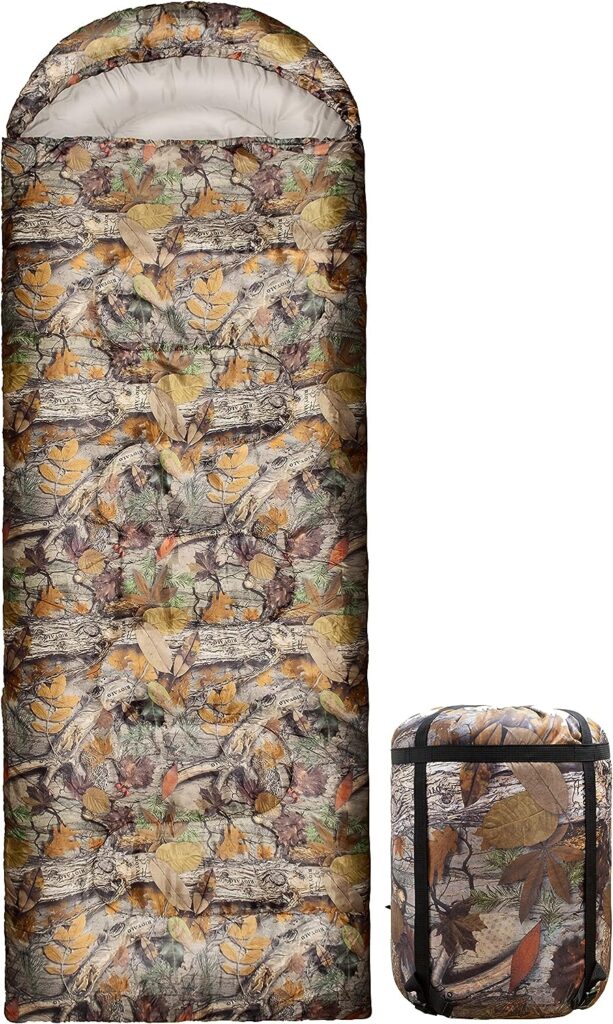
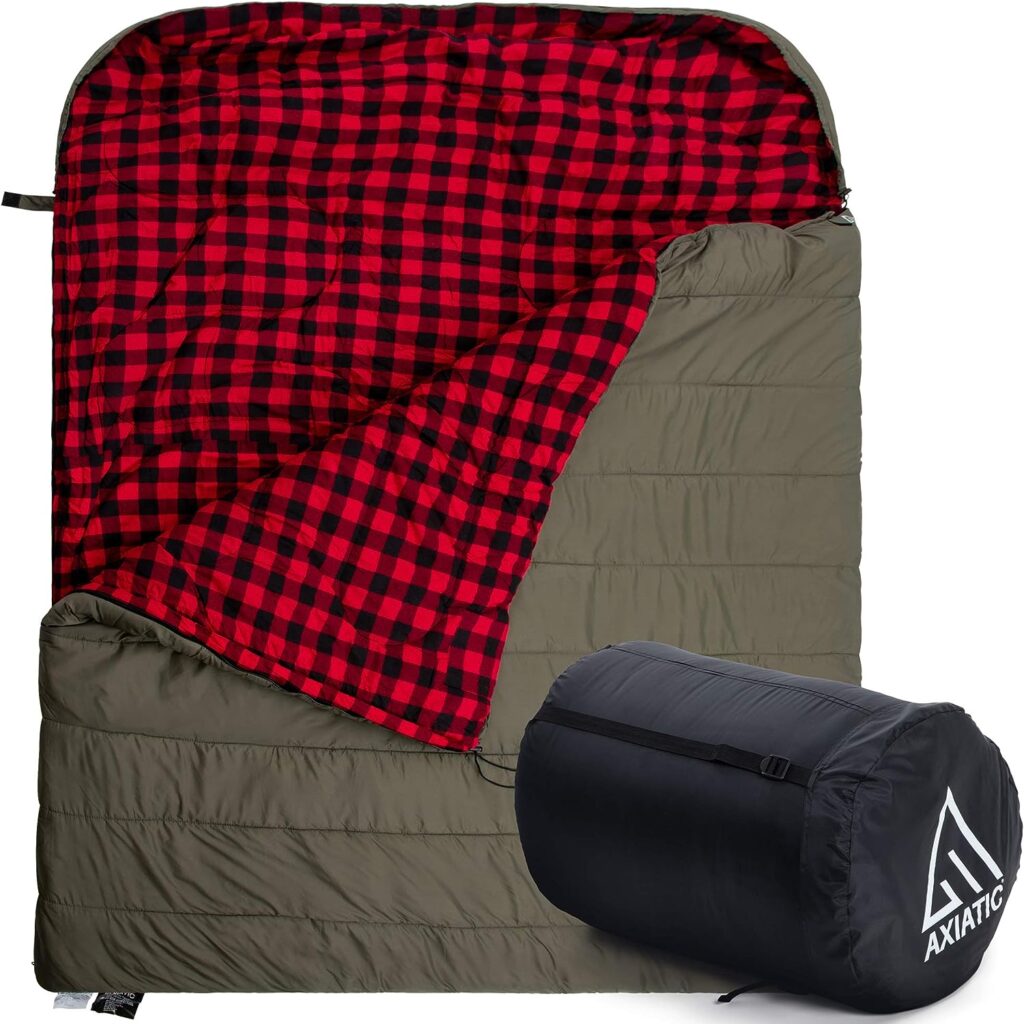
The importance of a comfortable and portable sleeping bag for adult travelers
The sleeping bag is a frequently overlooked but critical piece of your travel equipment, even if you might be more concerned with organizing your itinerary and packing your basics.
Cost-Effective
In the long run, purchasing your own sleeping bag may be more economical. You have a dependable sleep solution that pays for itself over time rather than depending on the sometimes pricey or poor bedding provided by hotels.
Peace of mind
Travel may be erratic, and occasionally you could find yourself in predicaments where your intended lodgings don’t work out or you have to locate a strange location to sleep. Knowing that you’re always ready for unforeseen circumstances by carrying a portable sleeping bag gives you peace of mind.
Hygiene and comfort
Although many lodgings make an effort to keep their spaces clean, nothing can replace your own bedding. Particularly in shared dorm rooms or when tent camping in the woods, travel sleeping bags guarantee you have a clean and sanitary sleeping surface.
Personalized Comfort
Whether you want snug mummy-style bags or large rectangle bags, you may discover the ideal fit for a restful night’s sleep.
By making a quality sleeping bag purchase, you may rest well wherever your wanderlust leads you while being well-equipped to face the adventures and difficulties of your travel journey.
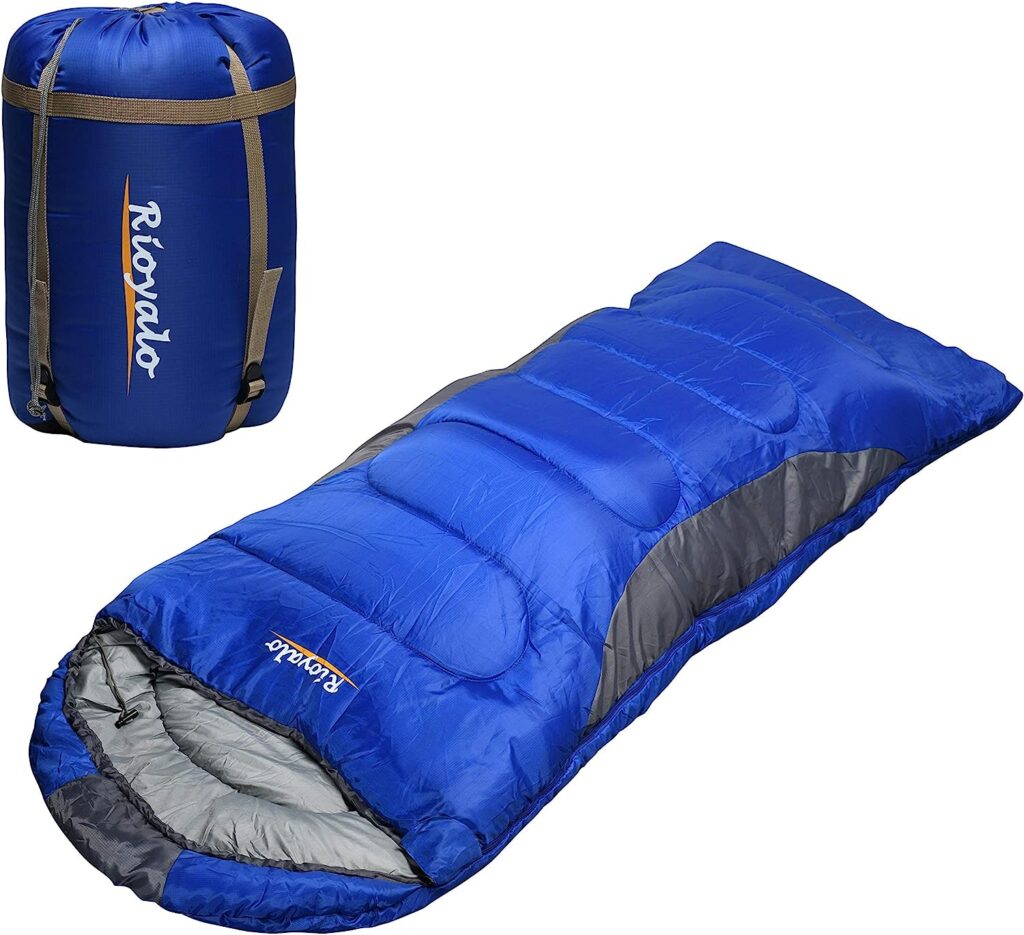
Types of Travel Sleeping Bags
Here are a few popular varieties of sleeping bags for travel:
Ultralight sleeping bags
Designed with minimalists and travelers in mind.
Compact and incredibly light for simple transportation.
Perfect for warm-weather travel where little insulation is required.
To lose weight, some comfort may have to be given up.
Mummy sleeping bags
Drawstring-adjustable hood with protection for the head and face
Due to the close fit, there is little space for mobility.
Rectangular sleeping bags
Design with enough space for comfort and mobility.
It’s appropriate for campers who value space above insulation.
Offer a lower level of heat retention than mummy bags.
Three-Season Sleeping Bags
Suitable for a wide variety of above-freezing temperatures.
Give the right amount of warmth and ventilation.
The typical selection for all-purpose travel sleeping bags.
Winter sleeping bags
Heavy-duty bags for winter camping and extremely low temperatures.
Outstanding insulation and heat retention.
Include draft collars and extra insulating layers often.
Less portable and bulkier than three-season alternatives.
Convertible sleeping bags
Bags that are adaptable to different weather situations.
Include detachable layers or zippered portions to allow for customization.
Suited for travelers who desire a single piece of luggage for several trips.
Double Sleeping Bags
Designed to fit two people, making it perfect for families or couples.
For comfort, they are frequently rectangular or square-shaped.
Obtainable in a range of temperature ratings to accommodate varied regions.
Bigger and larger than luggage for one person.
Ultracompact Sleeping Bags
Designed for lightweight, minimalist travelers who put weight and space first.
For optimal mobility, some insulation or comfort may be sacrificed.
Ideal for adventurers and travelers.
Envelope sleeping bags
The simple zippered rectangle has a rectangular form.
Adequate for usage indoors or in mild weather, but not as good in harsh situations.
Accessible and reasonably priced.
Hybrid sleeping bags
Combine the characteristics of several forms, including mummy and rectangular shapes.
Offer a compromise between heat efficiency and roominess.
Ideal for travelers who need adaptability without making too many compromises on either end.
Your location, the time of year you’ll be traveling, your particular preferences for comfort and mobility, and your budget all play a role in choosing the best kind of travel sleeping bag.
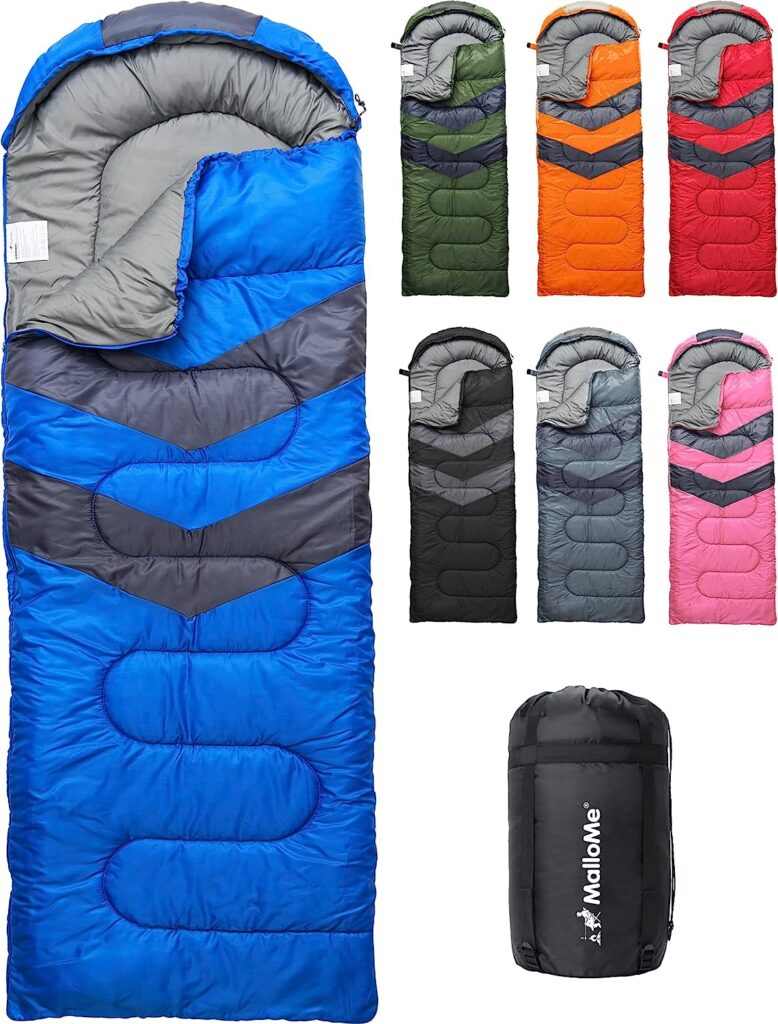
Materials and Insulation
Here is a list of typical components and varieties of insulation used in travel sleeping bags:
Shell Fabric
The sleeping bag’s outer layer is often constructed of nylon or synthetic fabrics.
offers toughness, water resistance, and wear and tear defense.
For further protection in damp weather, some bags feature coatings that are water-repellent or waterproof.
Down Insulation
composed of the delicate feathers that lie beneath a duck’s or goose’s outer feathers.
Quality down is suitable for cold-weather sleeping bags since it is lightweight and provides good insulation.
vulnerable to moisture; when wet, it loses its ability to act as insulation.
Synthetic Insulation
resists moisture and keeps some insulating qualities after becoming wet.
Typically less expensive than insulation made of down.
Ideal for moist or humid circumstances and for people who have moral reservations about using animal products.
Continuous-Filament Insulation
In high-quality sleeping bags, continuous-fiber synthetic insulation is frequently employed.
good loft, durability, and warmth.
continues to be insulating even after being compressed repeatedly.
Cluster-Insulated Fill
Clusters of down feathers are used as insulation in down products.
compares favorably to continuous-filament insulation in terms of warmth and loft.
clumping-resistant, keeping it insulating even when exposed to minor dampness.
Short-Staple Insulation
The fibers used to create synthetic insulation are shorter.
Usually less costly than options using continuous filament.
Warmth is acceptable, but with time, you may lose loft and insulation.
Hybrid Insulation
a sleeping bag that contains a variety of insulating materials.
provide a good combination of warmth, moisture resistance, and affordability.
Some bags may feature synthetic insulation on the bottom for moisture resistance and down insulation on the top for warmth.
Reflective Insulation
Some sleeping bag liners and bivvy bags are made of thin, reflective materials like Mylar.
enhances warmth in lightweight and compact forms by reflecting body heat back toward the wearer.
Your unique demands and the circumstances you anticipate experiencing throughout your journeys will determine the best insulation and materials to use for your travel sleeping bag. In frigid climates, down insulation provides tremendous warmth, while synthetic insulation provides adaptability and moisture resistance.
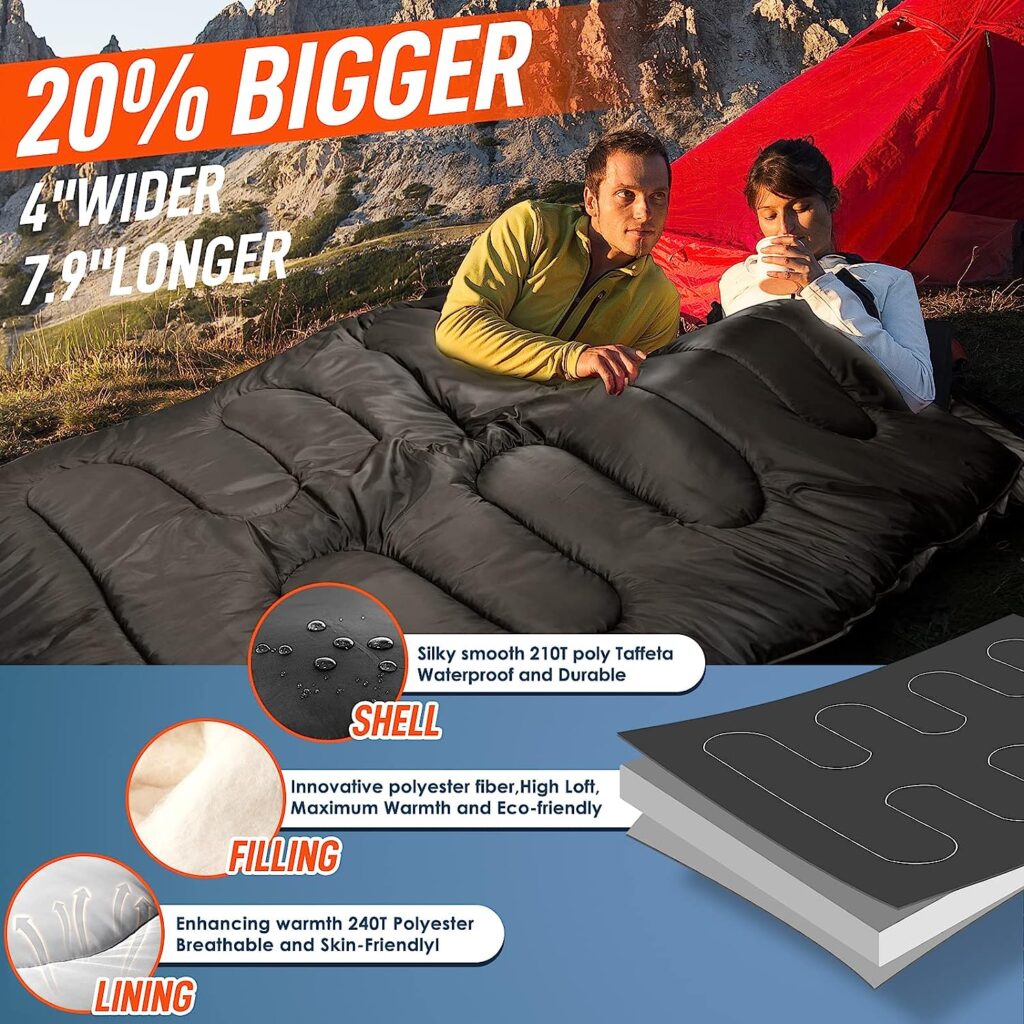
Size and Packability
Particularly for travelers who value mobility, space efficiency, and simple transportation of their gear, the size and packability of a travel sleeping bag are important elements to take into account. What to consider while assessing the size and packability of a travel sleeping bag is broken down as follows:
Packed Size
The sleeping bag’s size after it has been rolled up or compressed for storage and transportation
Travelers choose smaller packs since they take up less room in baggage or backpacks.
Unpacked Size
The sleeping bag’s proportions when completely unfolded and in use
Make sure the unpacked size allows you to move and stretch as needed while properly accommodating your body.
Unpacked, rectangular sleeping bags often have bigger dimensions, giving the user more space.
Weight
Weight is directly connected to size, despite not being a direct measurement, and is crucial for portability.
For travel, sleeping bags that are lightweight are favored since they lighten the load on the rest of your luggage.
Models that are ultralight in weight are perfect for lengthy excursions and hiking.
Compression Sacks
Numerous sleeping bags for travel are compatible with or come with compression sacks.
useful for conserving room in your luggage or backpack.
Stuff Sacks
Stuff sacks are frequently included with sleeping bags as basic storage.
Despite the fact that they don’t compress the bag as much as compression sacks, they nevertheless aid in keeping it organized and safe.
Loft Recovery
The term “loft” describes the thickness and fluffiness of the insulation of a sleeping bag.
The best insulation and warmth are provided by high-quality sleeping bags with exceptional loft recovery, which quickly restore their full loft after being unpacked.
Hybrid Designs
As an illustration, a bag may include synthetic insulation on the bottom for compressibility and moisture resistance and down insulation on the top for warmth.
Think about your travel preferences, your intended location, and your means of transportation when evaluating the size and packability of a travel sleeping bag. While vehicle campers may have greater freedom to select bigger sleeping bags, backpackers and hikers may favor smaller, lighter choices.
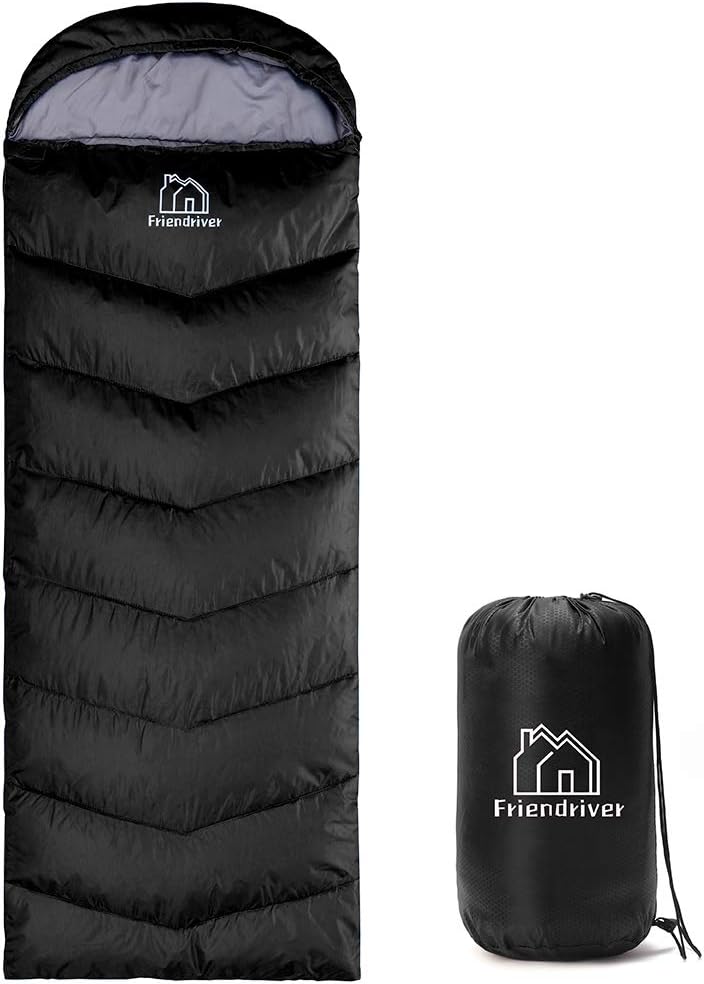
Maintenance and Care
Your travel sleeping bag must be properly maintained and cared for in order to guarantee its durability, functionality, and hygiene. You can keep your sleeping bag fresh, cozy, and prepared for your next excursion according to these rules:
Regular Cleaning
Follow the manufacturer’s cleaning recommendations, which are often listed in the product handbook or on a sticker attached to the sleeping bag.
Cleaning techniques for down and synthetic sleeping bags may differ. While synthetic bags are more robust and can tolerate machine cleaning, down-filled bags can frequently be machine-washed.
To protect the fabric and insulation of the bag, wash it in a big industrial washer or a front-loading machine.
Drying
To assist in fluffing the insulation and restoring the loft, most sleeping bags may be tumble-dried on low using clean tennis balls or dryer balls.
The sleeping bag may also be air-dried by putting it flat on a spotless, dry surface and rotating it occasionally until it is totally dry. Although it could take longer, this approach is more kind to the bag’s components.
Storage
Long-term compression might harm the insulation, so avoid doing it. Instead, hang it by its loops or place it in a roomy, airy storage bag.
To keep your sleeping bag’s loft between journeys, store it uncompressed.
Repair
Check your sleeping bag often for any tears, frayed threads, or broken zippers.
Use a repair kit made for outdoor gear to quickly fix small damages with patches, tape, or stitching.
Avoid eating inside
Avoid eating inside your sleeping bag to prevent food scents and crumbs from luring bugs or leaving lingering odors there.
You may increase the lifespan of your vacation sleeping bag, make sure it continues to be functional and cozy, and retain it in wonderful shape for a lot more trips by using these upkeep and care suggestions.
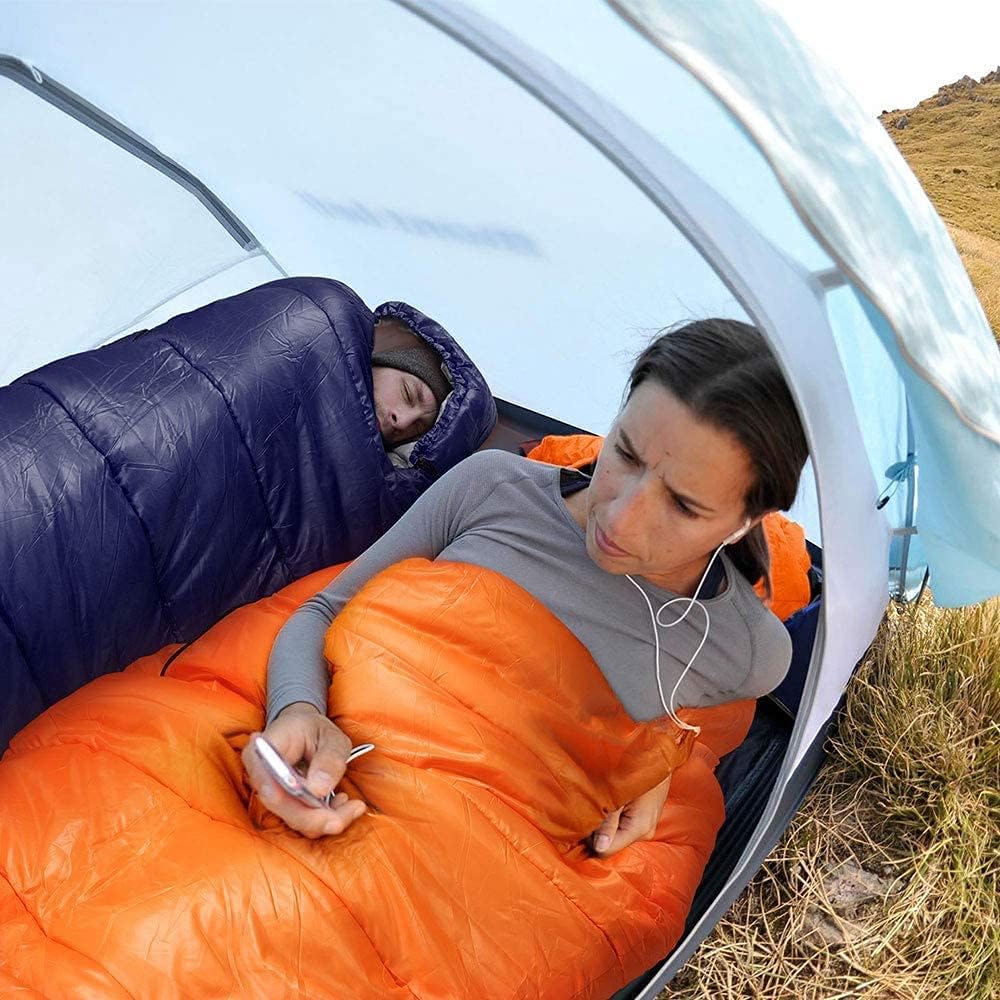
Conclusion
The selection of a travel sleeping bag for adults is not only a matter of convenience in the world of travel, where the attraction of discovery meets the desire for a comfortable respite.
Adult travel sleeping bags are more than simply useful equipment; they are entrance tickets to a world where luxury and adventure dwell together.
They transform uncomfortable hostel beds, tent floors, and sleeper train berths into comfortable havens, making sure that your pursuit of new vistas never comes at the expense of some well-earned slumber.
There is a travel sleeping bag designed just for your own travel style, from the lightest, minimalist styles created for trailblazers to the big, rectangular bags that allow you to spread out and dream.
You can be sure that your nights away from home will be both reviving and thrilling, both physically and figuratively speaking.
Therefore, keep your selected travel sleeping bag’s warmth and comfort in mind when you set off on your next excursion.
What are your thoughts about sleeping bags for adults?
Why book with Viator.com? Do more with Viator
For Top Destinations! Top Attractions! Top Tours. Just get the best out of Viator today.

Ivisa.com helps you find Visa information for all countries. Simplifying Travel Around The World and also offers Online Travel Visa Checks.

I recommend Booking.com because is a great place for hotel bookings with No Booking Fees. Low Rates. Best Price Guarantee.

Trip.com is another good website where you can make your flight bookings with Low-cost flights and easy booking with Instant confirmation.

We could receive a little commission. if you purchase after clicking one of our links. This helps us to maintain the website, and we sincerely appreciate it.
